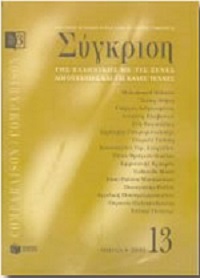The notion of the homeland in the novels Φιλέλληνες (Philhellenes) by M. Kranaki and Camere separate (Separated Rooms) by P.V. Tondelli
Abstract
This article examines the novel's point of view relating to the notion of homeland as a native land. We have chosen for that purpose two contemporary novels, a Greek and an Italian, aiming at searching the question by comparison. As for our methodology we move within the bounds of Sociology of Literature and we evaluate the narrative organization of the text as well as the sociological and linguistic approach, so that the results to be confirmed based on the same textual material. We conclude that their story criticizes the dominant view of the homeland as native land and proposes several ways to define it. The homeland is seen as time, action, the beloved etc. This attitude, which at the same time is been criticized, challenges the dominant conception of land, it would be classified as «alternative» and this sort of fiction as «alternative fiction».
Article Details
- How to Cite
-
Ευαγγέλου Κ. Γ. (2017). The notion of the homeland in the novels Φιλέλληνες (Philhellenes) by M. Kranaki and Camere separate (Separated Rooms) by P.V. Tondelli. Comparison, 13, 183–199. https://doi.org/10.12681/comparison.10712
- Issue
- Vol. 13 (2002)
- Section
- Articles

This work is licensed under a Creative Commons Attribution-NonCommercial-ShareAlike 4.0 International License.
Authors who publish with this journal agree to the following terms:
- Authors retain copyright and grant the journal right of first publication with the work simultaneously licensed under a Creative Commons Attribution Non-Commercial License that allows others to share the work with an acknowledgement of the work's authorship and initial publication in this journal.
- Authors are able to enter into separate, additional contractual arrangements for the non-exclusive distribution of the journal's published version of the work (e.g. post it to an institutional repository or publish it in a book), with an acknowledgement of its initial publication in this journal.
- Authors are permitted and encouraged to post their work online (preferably in institutional repositories or on their website) prior to and during the submission process, as it can lead to productive exchanges, as well as earlier and greater citation of published work (See The Effect of Open Access).



